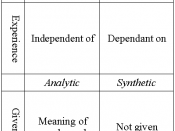Purpose
In this paper I will address certain flaws in Richard Taylor's argument in favor of fatalism. Foremost I will summarize the argument Taylor gives for fatalism. I will then address a significant point of invalidity in his argument. Subsequently I will offer a good-faith rebuttal to my counterpoint on behalf of Taylor followed by a final statement in support of my point.
I
In the sixth chapter of his book Metaphysics (3rd edition), entitled "Fate," Richard Taylor endeavors to describe and give an argument for the position of fatalism. Fatalism, as Taylor describes it, is the belief that whatever occurs is and for all the past has been unavoidable.
Taylor begins by pointing out that this position is distinct from the philosophical belief denoted by the term determinism in that determinism makes the claim that every occurrence is rendered unavoidable by the sum of past occurrences and the laws of nature whereas fatalism makes no claim as to how or why occurrences are unavoidable, only that they are.
In keeping with this distinction, true determinism is a type of fatalism for in the doctrine of determinism everything is rendered unavoidable by the past and the laws of nature. This is simply an extension of fatalism in that it makes a claim regarding how it is that all occurrences are unavoidable. Taylor claims that the number of determinists who do not endorse fatalism does not imply that determinism does not include fatalism, but rather it serves as an illustration of the difficulty one has in giving up the idea that man is somehow able to shape his destiny.
Taylor then goes on to liken the fatalist's conception of the future to the common conception of the past. It is nearly universally accepted that the past is unchangeable; it is beyond...


